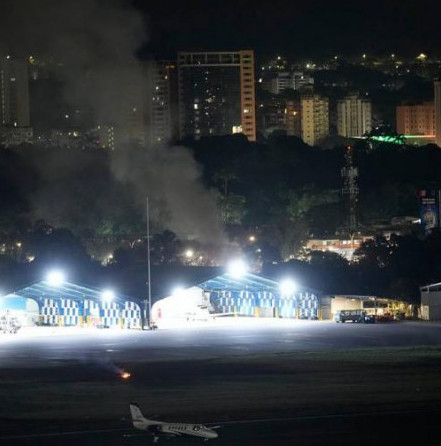As is known, Iran was supposed to halt all of its uranium enrichment-related projects by February 21, 2007, in line with the UN Security Council ultimatum. Iran failed to fulfill the requirement, but in fact, no one had really expected it to comply. What will happen next?
Nothing. At least, not right now or in the near future. Even though Washington responded by leaking parts of its plan to “punish” Ayatollahs to the media. Well, it is no secret that this military plan does exist, and not just because it has been earlier quoted on several occasions. One might presume that U.S. military headquarters have long devised similar strategies with regard to North Korea, Syria, Libya and Cuba, etc. The old plans of attacking Russia must be still there, too – with duly adjusted toponymic data and flight path parameters. Still having a strategy does not necessarily mean the operation could start anytime. A military operation requires an all-out preparatory effort, especially in the U.S. They even think of bringing fiction paperbacks to cheer up possible amputees, so I do not even have to mention their military foresight. Three months before the Iraq war started, as many as seven carrier decks had been deployed to the Gulf. At present, there are only two of them there, which is the first reason behind Tehran’s nerve.
Second, U.S. politicians aren’t ready for another large-scale war, either, so Tehran felt quite confident responding with a counter-offer. The increasingly aggravating standoff between the White House and the Democratic Congress precludes any compromise President Bush could count for.
Third, even a pinpoint air attack on Iran’s military bases will trigger off a ground operation, as Shia communities from both shores of the Gulf will take on the thinning-out pro-American forces in Iraq. In that case the “Brownian-style” internal conflict in Iraq (all-against-all) will become clearly anti-Western. The present Iraqi administration, let alone its military and security forces, is 80% made up of Shiites, with another 15% of Kurds and 5% of Sunnites. U.S. forecasts suggest that, if the war spreads to Iran, around one-third of the Iraqi Shiites will turn to fight local pro-U.S. collaborators, while at least as many will quit their service and run for their lives. I would add that the rest will hardly be motivated to cooperate with Americans. In addition, fleeing along with a direct contact with the enemy is fraught with enormous casualties, inadmissible even for combat action, while today it is still possible to leave quietly and safely.
Finally, even sanctions against Iraq (let alone a forceful operation) will predictably lead to a radicalization of that country’s regime. It will be mobilized for a national revenge, going beyond any negotiation and settlement. Well, one could drop a dozen bombs on Iranian bases, if they like. But to overthrow the “Ayatollah” regime, which is much more democratic than, say, the Saudi one, by the way – one would need to rely on ground forces. Even the U.S. will hardly cope with another “Iraq.” What Iran will do is simply close the 50-kilometer-wide Straits of Hormuz through which 20% of the world’s oil passes every day, thus blocking out the Gulf, using conventional weapons. The Iraqi oil, which supports the Baghdadi regime and Western geopolitical aspirations along with it, will have no export passage either. The international community will face an oil price of $150 or $200 per barrel, with the world energy markets’ collapse looming ahead.
Tehran’s counter-offer, which is more like a counter-ultimatum in fact, comes down to the following: Iran will only halt uranium enrichment upon the condition that Western nations do the same. “Why should their plants work while ours have to close down? Let’s stand up for our rights! Allah Akbar!” However, it is hard to figure out how close they actually are to making a nuclear bomb. According to IAEA, Tehran has had the uranium enrichment technology since August 2006 and can possibly start its production by the end of this year. Experience suggests that it will take Iran another 2-5 years to develop and test its nuclear weapons. For now, Iran does not even have a nuclear test ground. It has four nuclear facilities, hardly suitable for testing. These include nuclear research centers and plants in Isfahan, Arak, and Natanz, and the Bushehr facility still under construction. All of those facilities except the Arak one have been thoroughly inspected by international commissions, which made more assumptions than assertions.
I would emphasize once again that the problem is broader than the Gulf nations’ nuclear concerns. It is the lack of legal tools to discipline the Non-Proliferation Treaty violators. Moreover, the Iran case will eventually be the world’s first precedent. If we manage to settle this conflict, we’ll preserve the Treaty and come to an understanding with another 20 nations seeking to become nuclear powers. If we use force, first of all, the “Hypothetical 20” will most likely withdraw from the NPT so as not to violate it. Second, we’ll acknowledge the inability to prevent war. What will remain of the international law then, and what will it be for? On the other hand, a nuclear-free Iran is much more appealing, isn’t it?
Nothing. At least, not right now or in the near future. Even though Washington responded by leaking parts of its plan to “punish” Ayatollahs to the media. Well, it is no secret that this military plan does exist, and not just because it has been earlier quoted on several occasions. One might presume that U.S. military headquarters have long devised similar strategies with regard to North Korea, Syria, Libya and Cuba, etc. The old plans of attacking Russia must be still there, too – with duly adjusted toponymic data and flight path parameters. Still having a strategy does not necessarily mean the operation could start anytime. A military operation requires an all-out preparatory effort, especially in the U.S. They even think of bringing fiction paperbacks to cheer up possible amputees, so I do not even have to mention their military foresight. Three months before the Iraq war started, as many as seven carrier decks had been deployed to the Gulf. At present, there are only two of them there, which is the first reason behind Tehran’s nerve.
Second, U.S. politicians aren’t ready for another large-scale war, either, so Tehran felt quite confident responding with a counter-offer. The increasingly aggravating standoff between the White House and the Democratic Congress precludes any compromise President Bush could count for.
Third, even a pinpoint air attack on Iran’s military bases will trigger off a ground operation, as Shia communities from both shores of the Gulf will take on the thinning-out pro-American forces in Iraq. In that case the “Brownian-style” internal conflict in Iraq (all-against-all) will become clearly anti-Western. The present Iraqi administration, let alone its military and security forces, is 80% made up of Shiites, with another 15% of Kurds and 5% of Sunnites. U.S. forecasts suggest that, if the war spreads to Iran, around one-third of the Iraqi Shiites will turn to fight local pro-U.S. collaborators, while at least as many will quit their service and run for their lives. I would add that the rest will hardly be motivated to cooperate with Americans. In addition, fleeing along with a direct contact with the enemy is fraught with enormous casualties, inadmissible even for combat action, while today it is still possible to leave quietly and safely.
Finally, even sanctions against Iraq (let alone a forceful operation) will predictably lead to a radicalization of that country’s regime. It will be mobilized for a national revenge, going beyond any negotiation and settlement. Well, one could drop a dozen bombs on Iranian bases, if they like. But to overthrow the “Ayatollah” regime, which is much more democratic than, say, the Saudi one, by the way – one would need to rely on ground forces. Even the U.S. will hardly cope with another “Iraq.” What Iran will do is simply close the 50-kilometer-wide Straits of Hormuz through which 20% of the world’s oil passes every day, thus blocking out the Gulf, using conventional weapons. The Iraqi oil, which supports the Baghdadi regime and Western geopolitical aspirations along with it, will have no export passage either. The international community will face an oil price of $150 or $200 per barrel, with the world energy markets’ collapse looming ahead.
Tehran’s counter-offer, which is more like a counter-ultimatum in fact, comes down to the following: Iran will only halt uranium enrichment upon the condition that Western nations do the same. “Why should their plants work while ours have to close down? Let’s stand up for our rights! Allah Akbar!” However, it is hard to figure out how close they actually are to making a nuclear bomb. According to IAEA, Tehran has had the uranium enrichment technology since August 2006 and can possibly start its production by the end of this year. Experience suggests that it will take Iran another 2-5 years to develop and test its nuclear weapons. For now, Iran does not even have a nuclear test ground. It has four nuclear facilities, hardly suitable for testing. These include nuclear research centers and plants in Isfahan, Arak, and Natanz, and the Bushehr facility still under construction. All of those facilities except the Arak one have been thoroughly inspected by international commissions, which made more assumptions than assertions.
I would emphasize once again that the problem is broader than the Gulf nations’ nuclear concerns. It is the lack of legal tools to discipline the Non-Proliferation Treaty violators. Moreover, the Iran case will eventually be the world’s first precedent. If we manage to settle this conflict, we’ll preserve the Treaty and come to an understanding with another 20 nations seeking to become nuclear powers. If we use force, first of all, the “Hypothetical 20” will most likely withdraw from the NPT so as not to violate it. Second, we’ll acknowledge the inability to prevent war. What will remain of the international law then, and what will it be for? On the other hand, a nuclear-free Iran is much more appealing, isn’t it?


